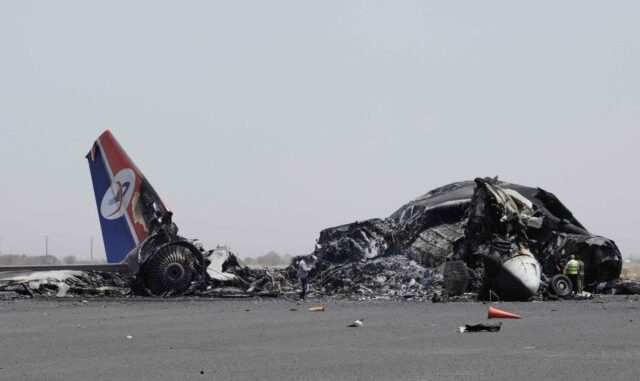
| Published July 7, 2025
On Sunday, July 6, 2025, Israel intercepted a ballistic missile launched from Yemen by Houthi rebels. In a swift countermove, Israeli jets struck Houthi-controlled ports (Hodeidah, Ras Isa, Salif), the Ras Qantib power plant, and the Galaxy Leader ship. These events follow a significant Houthi attack on a commercial vessel in the Red Sea. The exchange marks a dangerous flare-up in the wider Middle East conflict, threatening both regional security and global shipping routes.
🎯 What happened
1. Houthi missile from Yemen intercepted over Israel (July 6, 2025):
Early Sunday, Israel’s military reported intercepting a missile launched from Houthi-controlled Yemen targeting central Israel (near Jaffa), with sirens sounding in parts of the country. The Iran-aligned Houthi group later confirmed launching the ballistic missile, claiming it was in solidarity with Palestinians in Gaza.
2. Israel launches airstrikes on Yemeni ports and infrastructure:
In response, the Israel Defense Forces conducted airstrikes targeting Houthi-controlled ports at Hodeidah, Ras Isa, Salif, and the Ras Qantib power plant. The strikes also hit the Galaxy Leader—a commercial vessel seized and repurposed by the Houthis—as it was equipped with radar to track maritime traffic.
3. Context: Houthi maritime attacks and rising regional tensions:
The shootdown follows a Houthi assault on the Greek-owned bulk carrier Magic Seas in the Red Sea, where the crew abandoned ship after it was hit by rocket-propelled grenades, small arms fire, and possibly drones. This marks the first direct strike by the Houthis on commercial shipping since December and underscores the ongoing escalation in the Red Sea corridor.
🔍 Why this matters
-
Supply chain at risk: The Red Sea is a vital artery for international trade. Houthis have carried out over 100 attacks on commercial vessels since late 2023, forcing ships to reroute around Africa’s Cape of Good Hope .
-
Regional escalation in Gaza conflict: Both sides frame their actions as part of a broader struggle—Israel citing defense against Iranian-backed proxies, and the Houthis expressing solidarity with Palestinians amid the Gaza war.
-
Risk of widening conflict: There’s growing fear this could spiral into broader confrontations, potentially drawing Iran, the U.S., or Western naval forces deeper into the Red Sea crisis .
 Resulting Effects
Resulting Effects
1. Increased Risk of Regional War
-
The tit-for-tat between Israel and the Houthis—an Iranian proxy—raises the likelihood of a broader regional conflict.
-
If Iran openly backs future Houthi offensives or if Israel escalates its response, other Iranian proxies in Lebanon (Hezbollah) or Iraq could join in.
2. Heightened Maritime Instability
-
The Red Sea and Bab al-Mandab Strait, crucial for global oil and goods shipping, are now even more dangerous.
-
Major shipping lines may divert routes, increasing global shipping times and freight costs—potentially affecting consumer prices worldwide.
3. Strained U.S. and Western Naval Resources
-
The U.S. Navy and allies (like the U.K.) may have to expand patrols and escorts for commercial vessels, stretching already thin maritime operations.
-
Pressure may grow on Western governments to launch joint strikes or support Israel militarily, depending on future Houthi aggression.
4. Humanitarian Concerns in Yemen
-
Israeli strikes on Hodeidah and Salif ports—key entry points for food and aid—could worsen Yemen’s humanitarian crisis.
-
Millions rely on these ports for imports, and any disruption could trigger food shortages or famine, especially in Houthi-held areas.
5. Boost to Iranian Influence Narrative
-
Iran is likely to use the Houthi missile strike—and Israel’s military response—to paint itself as a defender of Gaza and regional resistance, fueling anti-Israel and anti-West sentiment in Arab countries.
-
This strengthens Iran’s ideological reach across the Middle East.
6. Political Fallout for Israeli Leadership
-
Internally, Israeli Prime Minister Benjamin Netanyahu may gain temporary support for decisive retaliation.
-
However, prolonged conflict on multiple fronts (Gaza, Lebanon, Red Sea) could strain Israel’s military and economic capacity, and cause dissent at home.
7. Signal of Houthi Long-Range Capabilities
-
The fact that the Houthis successfully launched a ballistic missile toward central Israel shows improved range and targeting, likely with Iranian support.
-
This may shift military assessments in Saudi Arabia, the UAE, and Egypt, pushing them to revise their defenses or align more closely with Israel.
 Bottom Line:
Bottom Line:
The July 6th missile attack on Israel by Iranian-backed Houthis is not just another flare-up—it’s a clear sign of the growing reach and boldness of radical Islamist proxies operating under Tehran’s umbrella. Despite international hand-wringing and endless UN warnings, it is once again Israel that must act alone to defend its civilians, shipping lanes, and national security.
The Biden administration’s weak stance on Iran and its return to Obama-era appeasement policies have only emboldened the enemies of the West. While the Houthis continue to target global trade and now launch missiles directly at Israeli cities, the White House dithers—refusing to designate the group as a foreign terrorist organization again and showing little appetite to confront Iran’s regional empire.
Meanwhile, Israel’s swift, precision airstrikes on Houthi-controlled ports and infrastructure are not only justified—they’re necessary. When deterrence fails, overwhelming force becomes the only language these terrorist regimes understand. It is long past time the international community stopped lecturing Israel on restraint and started supporting the only democracy in the Middle East as it faces down the growing axis of Iran, Hamas, Hezbollah, and now the Houthis.
If Israel’s enemies can launch missiles from over 1,000 miles away with impunity, the next question is obvious: Who’s next? The time for clarity and resolve is now—not just from Jerusalem, but from Washington and the West.
SOURCES: BREITBART – Israel Pounds Houthis in Yemen After Another Missile Intercepted
REUTERS – Israeli military says intercepted missile launched from Yemen
FINANCIAL TIMES – Israel strikes Yemeni ports soon after apparent Houthi attack on Red Sea vessel
AP NEWS – Israel launches airstrikes targeting Yemen’s Houthi rebels, and Houthis launch missile at Israel





Be the first to comment